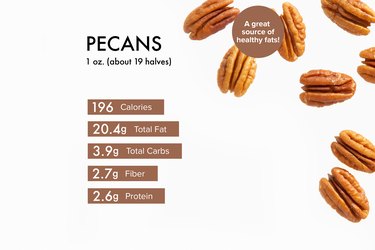
The pecan is a heart-healthy tree nut worthy of time in the spotlight (and on your plate). Although pecans don't always receive as much buzz as other superfoods, they are nutrient powerhouses in their own right.
Pecans are filled with healthy fats, fiber, minerals and antioxidants that are linked to helping you ward off disease, manage or lose weight and even live longer.
Video of the Day
Video of the Day
As a versatile ingredient, this tree nut is a delicious, crunchy addition to your meals, snacks and overall diet.
Pecan Nutrition Facts
One ounce of pecans (about 19 pecan halves) is equal to a single serving. One ounce of pecans contains:
- Calories: 196
- Total fat: 20.4 g
- Cholesterol: 0 mg
- Sodium: 0 mg
- Total carbs: 3.9 g
- Dietary fiber: 2.7 g
- Sugar: 1.1 g
- Added sugar: 0 g
- Protein: 2.6 g
Pecan Macros
- Total fat: One ounce of pecans has 20.4 grams of total fat, which includes 11.5 grams of monounsaturated fat, 6 grams of polyunsaturated fat, 1.8 grams of saturated fat and 0 grams of trans fat.
- Carbohydrates: One ounce of pecans has 3.9 grams of carbs, which includes 2.7 grams of fiber and 1.1 grams of naturally occurring sugars.
- Protein: One ounce of pecans has 2.6 grams of protein.
Are Pecans a Rich Source of Protein?
While nuts like pecans are sources of protein, you probably can’t rely on them alone to meet your daily needs. One serving of pecans provides 2.6 grams of protein. “Nuts can contribute to a daily goal of about 10 to 35 percent of total daily calories from protein per day, but I’d call them a source of plant protein — not necessarily a rich source,” Mia Syn, RDN, tells LIVESTRONG.com.
Vitamins, Minerals and Other Micronutrients
- Manganese: 56% of your Daily Value (DV)
- Copper: 38% DV
- Zinc: 12% DV
- Magnesium: 8% DV
- One ounce of pecans is not a good source of iron (4% DV), vitamin B6 (4% DV), vitamin E (3% DV), potassium (2% DV) or calcium (2% DV).
How Do Pecans Compare to Other Tree Nuts?
Based on a 1-oz. serving | Pecans | Almonds | Walnuts | Pistachios |
|---|---|---|---|---|
Calories | 196 | 164 | 186 | 159 |
Total Fat | 20.4 g | 14.2 g | 18.5 g | 12.9 g |
Carbohydrates | 3.9 g | 6.1 g | 3.9 g | 7.7 g |
Dietary Fiber | 2.7 g | 3.6 g | 1.9 g | 3 g |
Protein | 2.6 g | 6 g | 4.3 g | 5.7 g |
Health Benefits of Pecans
Like all nuts, pecans can be part of a nutritious diet. They contain protein, healthy fats, fiber and antioxidants.
1. Pecans Are Tied to Good Heart Health
Nuts like pecans contain unsaturated fat, fiber and plant sterols — a substance that occurs naturally in nuts and can help lower harmful LDL cholesterol levels, according to the Mayo Clinic.
Low intake of heart-healthy nuts and seeds was associated with 8.5 percent of adult diet-related deaths due to heart disease, stroke and type 2 diabetes in a March 2017 study published in The Journal of the American Medical Association, which analyzed data from the CDC's National Health and Nutrition Examination Survey (NHANES) and national disease-specific mortality data.
Pecans contain more heart-healthy fiber than other nuts such as walnuts, cashews and Brazil nuts (but slightly less fiber than almonds or pistachios). With 2.7 grams of fiber per serving, pecans provide 11 percent of the DV.
Higher fiber intake is linked to a lower risk of metabolic syndrome, which is a combination of factors including high blood pressure, high levels of triglycerides, low levels of HDL (good) cholesterol and high insulin levels, that increase your risk of developing heart disease and diabetes, according to the Harvard T.H. Chan School of Public Health.
2. Pecans Are Filled With Antioxidants
Pecans are a rich source of antioxidants, compounds that help protect healthy cells from damage caused by free radicals, which are produced when your body digests food or is exposed to environmental sources like air pollution, sunlight or cigarette smoke.
That free radical damage is thought to play a role in a number of diseases, such as cancer, diabetes, heart diseases, Alzheimer's disease, Parkinson's disease and eye diseases such as cataracts and age-related macular degeneration, according to the National Institutes of Health.
Although all nuts are nutritious, pecans are more antioxidant-rich than chestnuts, pistachios and peanuts (however, they're lower in antioxidants than walnuts), per a January 2010 study published in the Nutrition Journal, which is still widely cited because it reviewed the total antioxidant content of more than 3,100 foods, beverages, spices, herbs and supplements.
Tip
Eating pecans with fruits and vegetables (say, by adding them to a salad), can help you get more out of the vitamins in the produce. “Because pecans are a source of healthy fats, they help us to better absorb fat-soluble vitamins A, D, E and K,” Syn says.
3. Pecans Might Help With Weight Management or Weight Loss
Pecans can keep you full longer than more refined, processed snacks.
"The healthy fats, fiber and protein in pecans make them a snack with staying power, which can help with weight management or weight loss," Syn says. "Pecans won't spike your blood sugar like snacks such as crackers would."
Simple carbohydrates (found in many processed snack foods) are digested rapidly and immediately send glucose into your bloodstream, which could spike your blood sugar and giving you quick energy — but ultimately resulting in a crash of fatigue, according to the American Heart Association.
What's more, snacking on pecans might help you live longer.
A May 2015 study published in the International Journal of Epidemiology observed that people between the ages of 55 and 69 who ate at least 10 grams of tree nuts or peanuts (about half a handful) daily had a lower risk of dying from major causes such as respiratory disease, cancer, diabetes or heart disease than those who did not eat nuts.
Can the Fat in Pecans Lead to Weight Gain?
The short answer: Not if you eat pecans in moderation. “Pecans are filled with vitamins and minerals, but you still want to consume them in moderation because they are calorically dense,” Syn says.
Pecans contain mostly healthy polyunsaturated and monounsaturated fats. You should aim to get 20 to 35 percent of your total daily calories from healthy fats like these, including less than 10 percent of calories per day from saturated fats, according to the Academy of Nutrition and Dietetics.
Fat contains more calories per gram than protein or carbohydrates, so it’s important to stick to the pecan serving size of 1 ounce.
Pecan Health Risks
Allergies
An allergy to tree nuts such as pecans is one of the eight most common types of food allergies, affecting an estimated 0.5 to 1 percent of the population, according to the American Academy of Allergy, Asthma & Immunology (AAAAI).
Although being allergic to one tree nut doesn't necessarily mean you'll be allergic to another, some tree nuts — like pecans and walnuts —are closely related, and may cause similar reactions.
It's important to consult an allergist to know your risk: Tree nut reactions can include life-threatening anaphylaxis. If you have a tree nut allergy, you should always have epinephrine with you, per the AAAAI.
Drug Interactions
There are currently no known drug interactions. Be sure to discuss any medication and food interactions with your health professional.

Pecan Recipes
Pecan Preparation and Helpful Tips
Pecans can be found year-round in raw and roasted varieties. Follow these tips to prepare them as a healthy snack or as part of a meal.
Opt for raw varieties. If you're buying packaged pecans, either raw or roasted, it's best to look for those with no added sodium, sugar or other ingredients.
Tip
If you want to add flavor to your pecans, Harvard Health Publishing recommends sprinkling raw nuts with turmeric, cinnamon or cocoa powder and roasting them at 350 degrees Fahrenheit (how long you roast them for will depend on the size and number of pecans).
Store in a cool place. Because pecans have high oil content, they can easily go rancid in warmer temperatures, according to the New Mexico State University College of Agricultural, Consumer and Environmental Sciences.
Shelled pecans will remain fresh for 3 months at 70 degrees Fahrenheit but can be stored for around a year at 32 to 36 degrees Fahrenheit. In-shell pecans typically stay fresh for 4 months at 70 degrees Fahrenheit and for around 18 months at 32 to 36 degrees Fahrenheit.
Alternatives to Pecans
Pecans are a nutritious source of healthy fats and fiber, both of which are linked to good heart health. They also contain plant-based protein, which helps you stay full, and antioxidants, which protect your cells from free radical damage linked to several diseases.
You can swap pecans for other tree nuts like walnuts, almonds and pistachios to enjoy many of the same health benefits.
"Most nuts have comparable nutrition, with healthy fats and moderate plant protein," Syn says. Regularly eating nuts like pecans is tied to a lower risk of premature death.
Although they're filled with a number of healthy nutrients, they're also calorically dense and can lead to weight gain if not eaten in moderation.
- My Food Data: "Pecans"
- My Food Data: "Almonds"
- My Food Data: "Walnuts"
- My Food Data: "Pistachios"
- Mayo Clinic: "Nuts and your heart: Eating nuts for heart health"
- The Journal of the American Medical Association: "Association Between Dietary Factors and Mortality From Heart Disease, Stroke, and Type 2 Diabetes in the United States"
- My Food Data: "Dry-Roasted Cashews"
- My Food Data: "Brazil Nuts"
- Harvard T.H. Chan School of Public Health: "Fiber"
- Academy of Nutrition and Dietetics: "Choose Healthy Fats"
- National Institutes of Health: "Antioxidants: In Depth"
- Nutrition Journal: "The total antioxidant content of more than 3100 foods, beverages, spices, herbs and supplements used worldwide"
- American Heart Association: "Carbohydrates"
- International Journal of Epidemiology: "Relationship of tree nut, peanut and peanut butter intake with total and cause-specific mortality: a cohort study and meta-analysis"
- American Academy of Allergy, Asthma & Immunology: "Everything You Need to Know About Tree Nut Allergy"
- Harvard Health Publishing: "Why nutritionists are crazy about nuts"
- New Mexico State University College of Agricultural, Consumer and Environmental Sciences: "Storing Pecans"